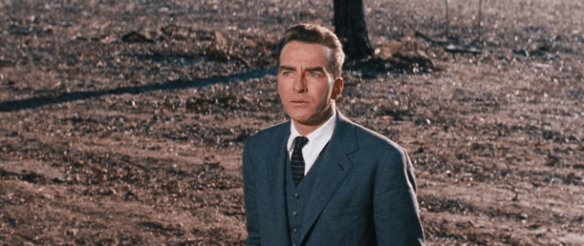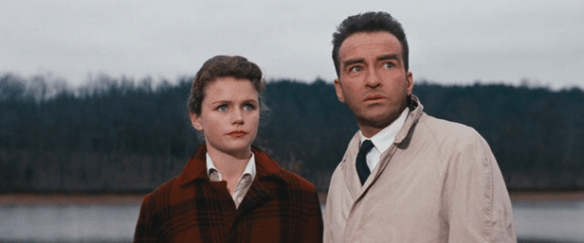
“You’re getting awful human aren’t you Chuck?” ~ Lee Remick as Carol
“I was always human, wasn’t I?” ~ Montgomery Clift as Chuck
With the mention of the Tennessee Valley Authority and what feels like Depression newsreel footage suggesting the work they are looking to do in the face of poverty, it becomes immediately apparent Elia Kazan’s Wild River feels very much like a docudrama.
Despite the raging water in the title, this is a surprisingly subdued picture especially given Kazan’s credentials. But there you have a dose of its enticement as a film that all but flies under the radar because it cannot be so easily attributed to the Method due to theatrics like a Streetcar Named Desire or East of Eden.
And yet there is no doubting the capabilities of a now weathered Montgomery Clift in this latter stage of his career. Fitting, as his name is linked, deservingly so, with the Brandos and the Deans for the jolt of newfound authenticity and masculinity they helped usher in within the Hollywood community.
However, unlike his compatriots, Clift was not a rising star partnering his talents with Kazan’s own intuitive handling of actors. He was a highly established and ceaselessly ingenious talent already. Clift never seems prone to histrionics but more crucially proves invested in emotional authenticity.
In this case, he is a man with an obvious task at hand. With a new TVA dam going in to provide electricity for the surrounding community, Chuck Glover is called upon to clear the area of all its occupants so the river valley can be completely flooded. The area has been all but vetted except for one lifelong unwavering inhabitant, Ella Garth (Jo Van Fleet) who lives on a solitary island with her grown sons and granddaughter.
She’s not too favorable toward TVA men and Glover’s predecessor gave up, finding the old lady unyielding. Still, the new man’s got to at least try because the Tenessee Valley Authority is intent on moving forward with progress.
As she showcased in everything from East of Eden and Cool Hand Luke, Jo Van Fleet could be a scene-stealer in her own right and she was consequently an adherent to a “Method” style, gelling with her director. Hence Kazan’s eagerness to cast her again. She doesn’t disappoint with her 45 years all but disappearing behind her performance filled with a resolute obstinacy, which is neither wholly bitter or overly pious.
One could situate Wild River as a Grapes of Wrath story from a sympathetic perspective. The wheels of progress are more of a benevolent aid to the public rather than an unfeeling force bulldozing the old for the new. The delineation is purposeful even as it leads to obviously divergent conclusions.
Chuck does not want to use force and he is looking to understand the local inhabitants so he can help them the best he can. Though the eldest Garth rejects his initial inquiries, he does find a sympathetic spirit in Carol Garth Baldwin (Lee Remick) who raises two children following the premature death of her husband. As the story progresses and Chuck keeps on plugging away in his mission, he and Carol slowly grow closer even as their worlds seem so far apart. There’s a glint of Norma Rae in how they come together. What matters is people’s convictions rather than their environment.
But to a slightly lesser degree, there’s the racial element as it seems like it would be ill-advised to draw up a story such as this without a certain enmity. Chuck just wants his job done and he’s ready to use black labor to do it. All the local southern white folks aren’t about that, much less equal wages.
He meets particular pushback from a local cotton plantation owner named Bailey (Albert Salmi) who doesn’t look on his presence too kindly. The same might be said of Walter Clark (Frank Overton) who has been Carol’s beau for some time. And yet their characters could not more starkly different. We get to understand them more deeply in due time.

One of the greatest pleasures of Wild River is the opportunity to study the faces of our leads in-depth. Lee Remick’s performance alone abounds with the unspoken feelings behind her eyes. It’s as if her eyes are the windows into her every emotion. Bright blue, at times pleading, other times aloof with a sadness we can only attempt to understand. But the film is made by its warmth and its subtleties, far more than any amount of blundering brutal magnetism. It comes out aging like a fine wine compared to some of its hothouse contemporaries.
The galvanizing moment comes when the local yokels try to scare Chuck off and have themselves a time goosestepping on the roof and ramming a truck into the side of a house; a shotgun even gets brought to the proceedings. The sheriff observes from a measured distance with mild amusement.
And yet when Chuck wanders out to face his perpetrators, there’s a resolve in his eyes. Surrounded by all these folks, he goes up to the spiteful man who is behind it all and proceeds to get wailed on. It’s almost pitiful. Our hero goes flailing, his girl starts climbing and clawing over the guy only to wind up in the mud right next to her lover.
It’s hardly a cinematic moment but it feels like a real one and the fact that our hero, Monty Clift, winds up so pitifully is a testament to this story. For the record, I’ve never gotten into a fist-fight. I’m a very flighty non-confrontational fellow but regardless, there’s something honest about how this one goes down.
One of the final shots is an equally fitting testament of what we have just witnessed. A solitary house on an island is set ablaze surrounded by water with an American flag dancing in the breeze. Maybe others feel the same emotion but the flag all but suggests this nation of ours has a complex relationship with progress. Where we must let go of the old to make way for the new. However, we must also reconcile each with the other.
Is it simply a part of life — the inevitable — or are there truly righteous and detrimental ways to go about it? The film is not forthcoming with its own answers. All we can do is sit back and ruminate. With a smile on our faces looking forward but nevertheless a lingering wistfulness for the past we left behind.
4/5 Stars
